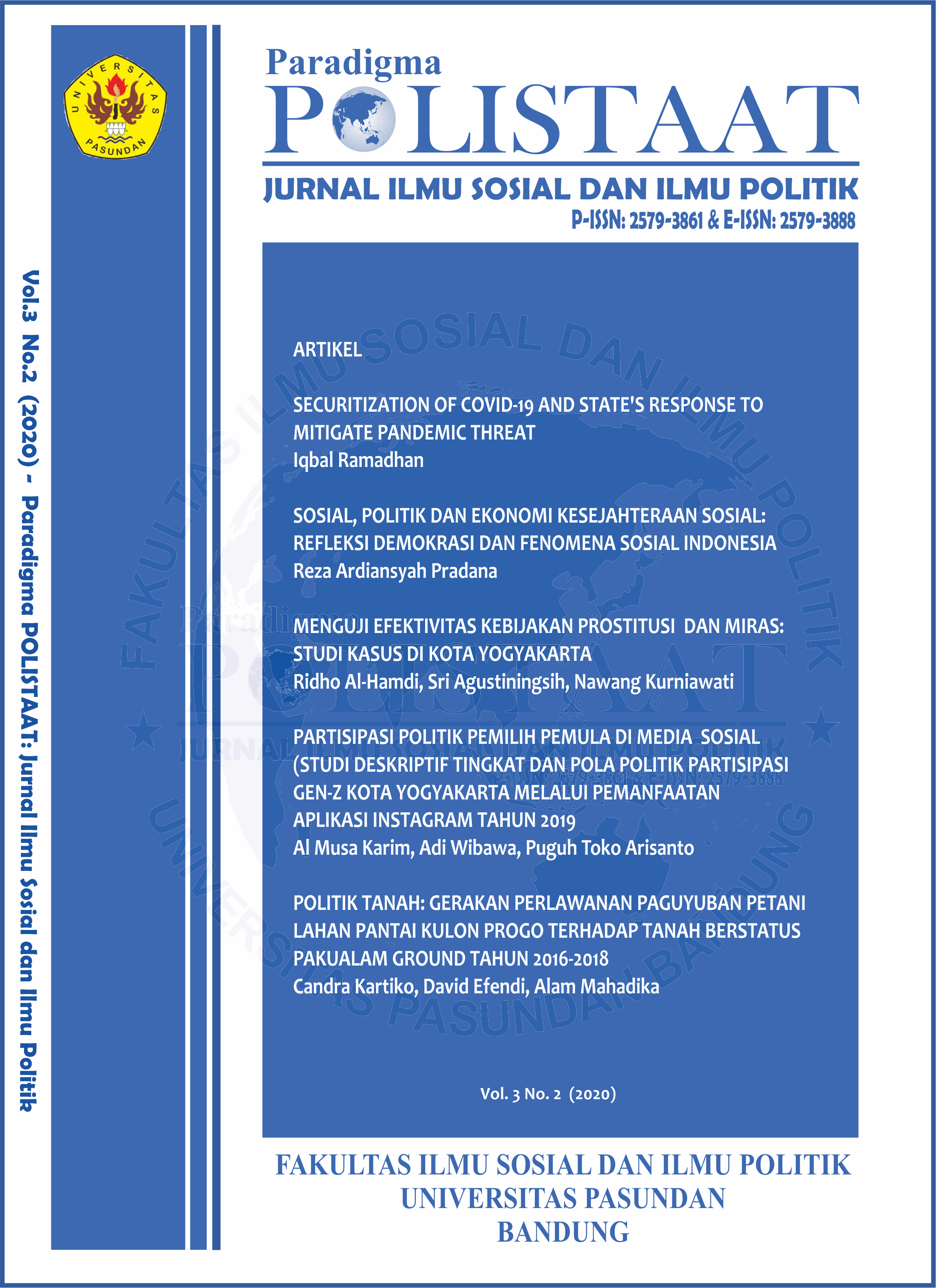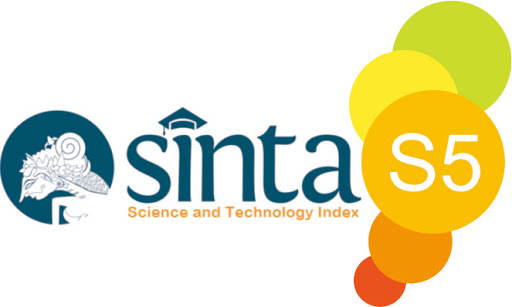SECURITIZATION OF COVID-19 AND STATE’S RESPONSE TO MITIGATE PANDEMIC THREAT
DOI:
https://doi.org/10.23969/paradigmapolistaat.v3i2.3611Keywords:
Security studies, securitization, Covid-19, pandemic.Abstract
Novel Coronavirus, commonly known as Covid-19, is a new type of viral species that has been discovered in China during November 2019. As of recent, Covid-19 has been a threat and a threat to the humans. Based on research performed by scientists, the coronavirus is a type of virus that can be transmitted to humans from wild animals. The first person infected with a virus is expected to appear in the city of Wuhan, China. Initially, Covid-19 was only endemic. Given the fact that so many people are infected with this virus, the WHO declared it a global pandemic. The Covid-19 phenomenon has gained prominence despite the danger that it presents to human life. The aim of this article is to analyze Covid-19 in the perspective of security studies. The author uses securitization concept to describe the Covid-19 phenomenon. The author used qualitative analysis methods. The author claims that the Covid-19 securitization process encourages state actors to define it as one of threat that needs to be overcame. Owing to variations in the securitization process between countries, the results are different among states. However, at one point, nation-state treated Covid-19 as a challenge to be solved. In the end, state actors need to strengthen their capabilities to stop the pandemic threat's pace.
Downloads
References
References
Aradau, C. (300-305). From Securitization Theory to Critical Approaches to (in)security. European Journal of International Security Vol.3 (3), 2018. doi:10.1017/eis.2018.14.
Balzacq, T. (2019). Securitization Theory: Past, Present, and Future. Polity Vol.51 (2). http://dx.doi.org/10.1086/701884.
Capano, G., et.al. (2020). Mobilizing Policy (In)Capacity to Fight Covid-19: Understanding Variations in State Responses. Policy and Society Vol.39 (3), 285-308. https://doi.org/10.1080/14494035.2020.1787628.
Capano, G. (2020). Policy Design and State Capacity in The Covid-19 Emergency in Italy: If Your Are Not Prepared for the (Un)expected, You Can be Only What You Already Are. Policy and Society Vol.39 (3), 326-344. DOI: 10.1080/14494035.2020.1783790.
Chattu, V. K., et.al. (2019). Global Health Diplomacy Fingerprints on Human Security. International Journal of Preventive Medecine Vo.10 (204), 1-4. DOI:10.4103/ijpvm.IJPVM_11_19.
Creswell, J. (2014). Research Design: Qualitative, Quantitative, and Mixed Methods Approaches (4th Eds). London: SAGE.
Djalante, R., et.al. (2020). Review and Analysis of Current Responses to Covid-19 in Indonesia Period of January to March 2020. Progress in Disaster Science Vol.6, 1-9. http://dx.doi.org/10.1016/j.pdisas.2020.100091.
Dwinanto, J., & Sumarni. (2020). Human Security, Social Stigma, and Global Health: The Covid-19 Pandemic in Indonesia. Journal of The Medical Sciences Vol.52 (3), 74-81. http://dx.doi.org/10.19106/JMedSciSI005203202008.
Gasper, D., & Gomez, O. A. (2015). Human Security Thinking in Practice: 'Personal Security', 'Citizen Security', and 'Comprehensive Mappings'. Contemporary Politics Vol.21 (1), 100-116. https://doi.org/10.1080/13569775.2014.993906.
Gomez, O. A., & Gasper, D. (2013). Human Security: A Thematic Guidance Note for Regional and National Human Development Report Teams. Retrieved from http://hdr.undp.org/sites/default/files/human_security_guidance_note_r-nhdrs.pdf. [Accessed, 9th of October 2020].
Hakim, M. S., et.al. (2020). Current Understanding of The Origin, Molecular Biology and Continuing Evolution of Severe Acute Respiratory Syndrome Coronavirus 2 (SARS-CoV-2). Journal of The Medical Sciences Vol.52 (3), 17-29. http://dx.doi.org/10.19106/JMedSciSI005202202003.
Hammarberg, K., et.al. (2016). Qualitative Research Methods: When to Use Them and How to Judge Them. Human Reproduction Vol.31 (3), 498-501. doi:10.1093/humrep/dev334.
Herington, J. (2010). Securitization of Infectious Diseases in Vietnam: The Cases of HIV and Avian Influenza. Health Policy and Planning Vol.25, 467-475. doi:10.1093/heapol/czq052.
Kalkman, J. P. (2019). Understanding The Social Construction of Crises: Comparing the Crisis-as-claim Model with Securitization Theory. Journal of Contingencies and Crisis Management, 1-2. DOI: 10.1111/1468-5973.12277.
Lee, S., et.al. (2020). Policy Learning and Crisis Policy-making: Quadruple-loop Learning and Covid-19 Responses in South Korea. Policy and Society Vol. 39 (3), 363-381. DOI: 10.1080/14494035.2020.1785195.
Liu, Y. C., Kuo, R. L., & Shih, S. R. (2020). Covid-19: The First Documented Coronavirus Pandemic in History. Biomedical Journal, 1-5. https://doi.org/10.1016/j.bj.2020.04.007.
Nunes, J. (2012). Health, Politics, and Security. Open Edition Journal Vol.15, 142-164. . DOI : 10.4000/eces.989.
Rokvic, V., & Zoran, J. (2015). Health Issues as Security Issues. Vojno Delo Vol.6, 53-69. DOI: 10.5937/vojdelo1506053R.
Roselle, L., & Spray, S. (2012). Research and Writing in International Relations. Boston: Pearson Longman.
Sheikh, M. K. (2018). Recursion or Rejection? Securitization Theory Faces Islamist Violenece and Foreign Religions. Global Discourse, 1-13. https://doi.org/10.1080/23269995.2017.1411644.
Shereen, M. A., et.al. (2020). Covid-19 Infection: Origin, Transmission, and Characteristic of Human Coronaviruses. Journal of Advanced Research Vol.24, 91-98. https://doi.org/10.1016/j.jare.2020.03.005.
Smith III, F. L. (2016). Malware and Disease: Lessons from Cyber Intelligence for Public Health Surveillance. Health Security Vol.14 (5), 1-10. DOI: 10.1089/hs.2015.0077.
Van Rythoven, E. (2019). The Securitization Dilemma. Journal of Global Security Studies Vol 0 (0), 1-16. DOI: 10.1093/jogss/ogz028.
WHO. (2020). Coronavirus Disease 2019 (Covid-19) Situation Report - 94. Retrieved from https://www.who.int/indonesia/news/novel-coronavirus/situation-reports. [Accessed, 9th of October 2020].
WHO. (2020). Water, Sanitation, Hygiene, and Waste Management for Sars-Cov-2, the Virus that Causes COVID-19. Retrieved from https://www.who.int/publications/i/item/water-sanitation-hygiene-and-waste-management-for-the-covid-19-virus-interim-guidance. [Accessed, 25th of October 2020].
Worldometers. (2020). Covid-19 Coronavirus Pandemic. Retrieved from https://www.worldometers.info/coronavirus/?. [Accessed, 20th of October 2020].
Wu, Y. C., Chen, C. S., & Chan, Y. J. (2020). The Outbreak of Covid-19: An Overview. Journal of The Chinese Medical Association Vol.83 (3), 217-220. Doi: 10.1097/JCMA.0000000000000270.
Yuk-ping, C. L., & Thomas, N. (2010). How is Health a Security Issue? Politics, Responses, and Issues. Health Policy and Planning Vol.25, 447-453. Doi:10.1093/heapol/czq063.
Zhao, T., & Wu, Z. (2020). Citizen-state Collaboration in Combating Covid-19 in China: Experiences and Lessons from The Perspective of Co-Production. America Review of Public Administration Vol.50 (6-7), 777-783. https://doi.org/10.1177/0275074020942455.
Downloads
Published
Issue
Section
License

Paradikma Polistaat: Jurnal Ilmu Sosial dan Ilmu politik is licensed under a Creative Commons Attribution-ShareAlike 4.0 International License
In order to be accepted and published by Paradigma POLISTAAT: Jurnal Ilmu Sosial dan Ilmu politik, author(s) submitting the article manuscript should complete all the review stages. By submitting the manuscript the author(s) agreed to these following terms:
1. The copyright of received articles shall be assigned to Paradigma POLISTAAT: Jurnal Ilmu Sosial dan Ilmu politikas the publisher of the journal. The intended copyright includes the right to publish articles in various forms (including reprints). Paradigma POLISTAAT: Jurnal Ilmu Sosial dan Ilmu politikmaintain the publishing rights to the published articles.
2. Authors are permitted to disseminate published article by sharing the link/DOI of the article at Paradigma POLISTAAT: Jurnal Ilmu Sosial dan Ilmu politik. authors are allowed to use their articles for any legal purposes deemed necessary without written permission fromParadigma POLISTAAT: Jurnal Ilmu Sosial dan Ilmu politik with an acknowledgement of initial publication to this journal.
3. Users/public use of this website will be licensed to CC BY-SA (Attribution & ShareAlike).















